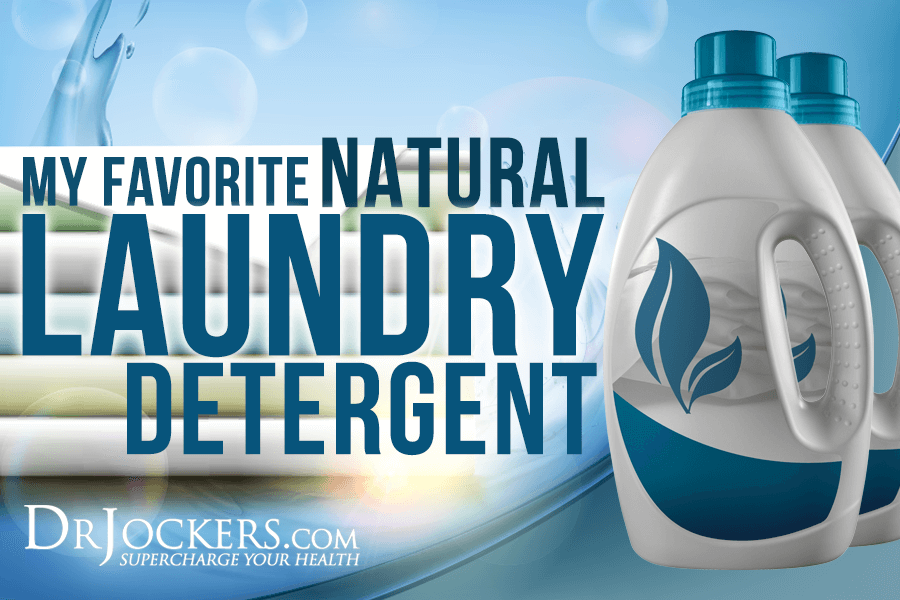 My Favorite Natural Laundry Detergent
My Favorite Natural Laundry Detergent
There is nothing better than fresh laundry. Having clean clothes that smell great is important. Do you know what else is important, though? Your health. Unfortunately, commercial laundry detergent is full of chemicals and toxins. They can cause irritation of your skin, eyes, respiratory tract, and lungs.
They may trigger allergic reactions and asthma. By increasing chronic inflammation, they may increase the risk of chronic symptoms and chronic health problems. Many ingredients are also carcinogenic and may increase your risk of cancer.
Choosing natural laundry detergent alternatives is important. It can be complicated though. You want something that works and is affordable. Some natural laundry detergents simply don’t do the job. And many of the ones that work even better than commercial laundry detergent options are very expensive. I have a recommendation to protect your health and your budget.
In this article, you will learn about all the chemicals in commercial laundry detergent. I will discuss the toxic bucket theory of health. You will learn about the importance of natural laundry detergent. I will debunk some myths about natural laundry detergent. I will compare some popular laundry detergents. Finally, I will share my favorite natural laundry detergent we use at home regularly.
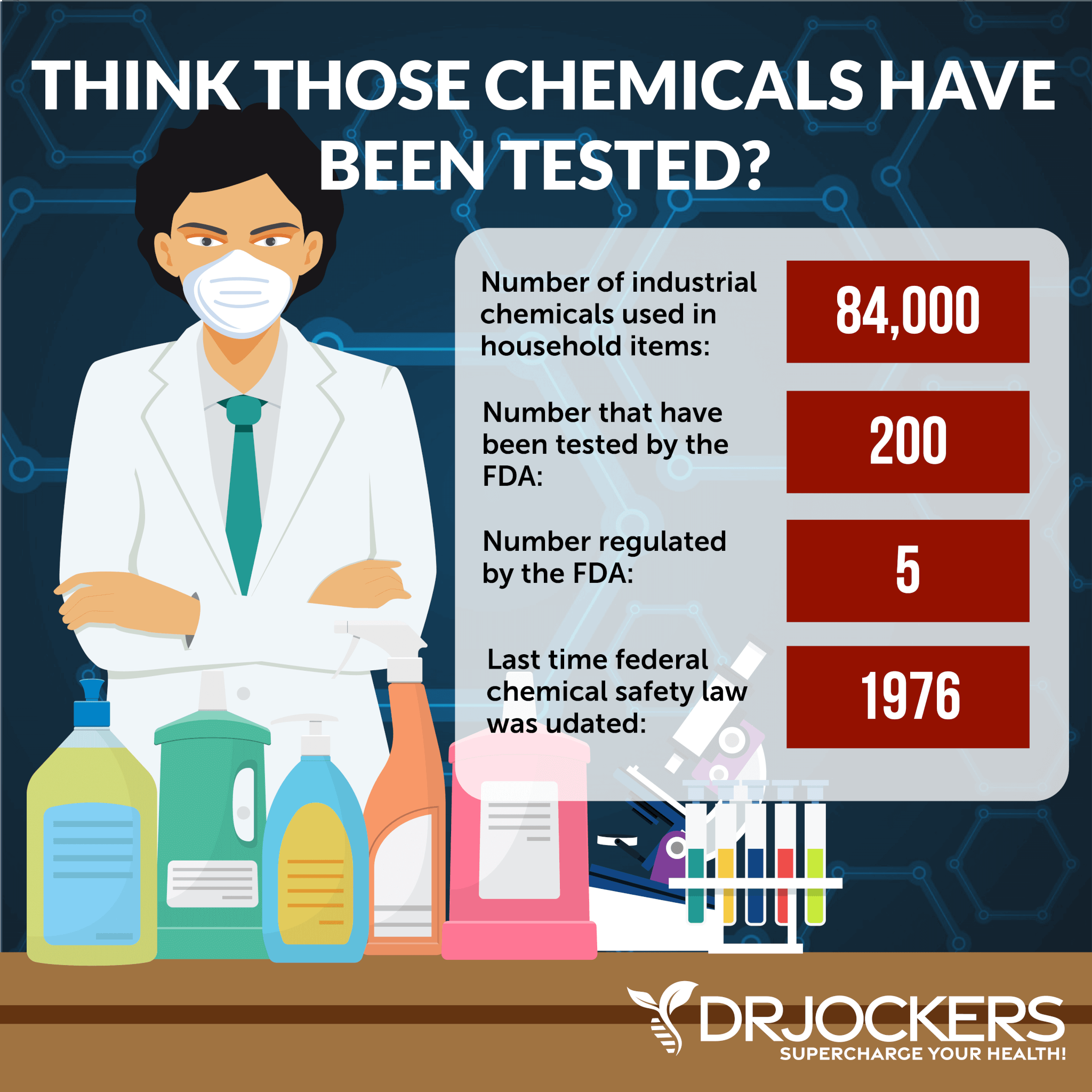
Chemicals in Commercial Laundry Detergent
We all like clean clothes. Unfortunately, commercial laundry detergent is full of harmful chemicals. Your clothes may get clean, but they may also be contaminated with harmful chemicals and toxins that can disrupt your health. Let’s look at the most common chemicals hiding in commercial laundry detergent:
- Sodium lauryl sulfate and sodium laureth sulfate/sodium lauryl ether sulfate (SLS/SLES): These chemicals are the main ingredients of most commercial laundry detergents, dish liquid soap, shampoo, and liquid hand wash. SLS and SLES are foaming agents that help to remove grease and soil. They were originally created to remove grease from garage floors and are now used in your laundry detergent and other household cleaning products. Yet, these chemicals can be incredibly irritating. According to a 2006 study published in Contact Dermatitis, SLS may cause skin irritation (1). It may also irritate your eyes and lungs. It may also increase chronic inflammation and consequent health issues from long-term exposure.
- Phosphates: Phosphates are another chemical found in laundry detergent that can be seriously problematic for your health. According to a 2014 research article published in Integrative Medicine (Encinitas), phosphate may increase the risk of osteoporosis, cardiovascular disease, and even all-cause mortality (2). It’s so problematic that it has been banned from being dumped or used in natural waterways in the Great Lakes Region to protect native marine animals from mineral poisoning and die-off (3).
- Formaldehyde: Formaldehyde is another toxic chemical in commercial laundry detergent and dish detergent. According to the Environmental Protection Agency (EPA) and the Centers for Disease Control and Protection (CDC), it is a class B1 probable cancer-causing substance (carcinogen) that may increase your risk of cancer (4, 5).
- Chlorine bleach: You may not be surprised to hear that chlorine bleach can be an irritant to your skin and health. According to a 2016 study published in Respiratory Medicine, using household cleaning products with chlorine bleach may increase the risk of non-allergic asthma (6).
- Ammonium sulfate: Ammonium sulfate is a toxic laundry additive. According to Global Safety Management, it may cause eye, skin, and respiratory irritation, and indoor use is not recommended (7). According to the EPA, it may be a carcinogen (8).
- Dioxane (1,4 Dioxane/Diethylene Dioxide/Diethylene Ether/Dioxane): Dioxane is a known carcinogen that can cause lung, respiratory, skin, and eye irritation and inflammation. According to a 2012 health advisory by the Agency for Toxic Substances and Disease Registry (US), it may also increase the risk of liver, kidney, nervous system, eye, skin, and other organ damage (9).
- Optical brighteners and UV brighteners: Optician brighteners are often used in laundry detergents to treat stains. However, instead of removing stains, they simply hide them from visible light. According to a 2019 study published in Materials (Basel), they may cause acute toxicity (10). They may cause lung, eye, and skin irritation.
- Ammonium quaternary sanitizers (quats/synthesized cationic surfactants): This is a cleaning additive also known as ‘quat’. They may cause eye, skin, and lung issues. According to a 2014 study published in Reproductive Toxicology, it may even increase the risk of infertility (11).
- Nonylphenol ethoxylates (Nonxynol, NPEs): NPEs can be incredibly toxic to your health. According to the US Department of Agriculture, and Forest Service, NPEs may cause toxicity, chronic toxic inflammation, skin and eye issues, neurotoxicity, immunotoxicity, and carcinogenesis (12).
- Fragrance and perfume: Manufacturers put fragrances into commercial laundry detergents to make them smell clean and nice. However, these fragrances are generally made from toxic chemicals that can irritate your body and cause health issues. According to a 2008 study published by the University of Washington, these fragrances may be toxic and potentially carcinogenic (13).
- Dyes: Though commercial laundry detergents have dyes in them, they don’t have any cleaning power to them. They only offer color, yet, they may cause allergies, and skin issues, and may be endocrine disruptors. According to the University of Maryland Medical System, dyes may cause contact dermatitis (14).
- Benzyl acetate: According to the International Peer Reviewed Chemical Safety Information (INCHEM), benzyl acetate may cause skin reactions, redness in the eye, respiratory or lung issues, and digestive problems (15). It may also damage your kidneys and affect the nervous system.
- Dichlorobenzene (P-dichlorobenzene or benzene): Benzene is another chemical in commercial laundry detergent that may harm your health. According to Global Safety Management, it may cause eye irritation and may be a potential carcinogen (16).
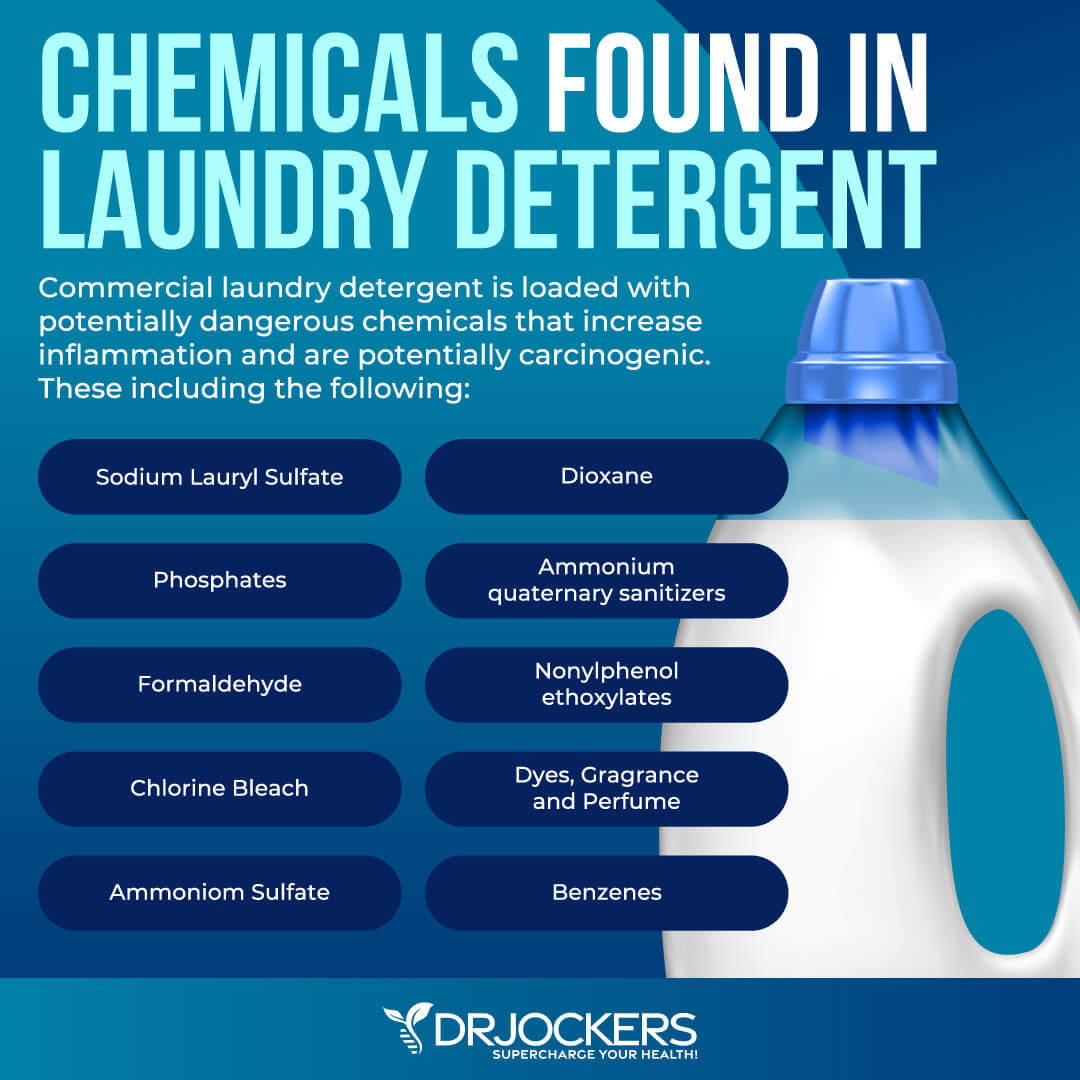
Toxic Bucket Theory of Health
Toxins are everywhere in our modern world. It’s impossible to completely escape toxin exposure. Your job is to reduce toxin exposure and prevent toxins from overflowing your bucket.
Imagining your body like a bucket may help you to understand how your health works. If you are only or mostly putting unhealthy things in your bucket, it will quickly overflow and lead to health issues.
Environmental toxins, including chemicals in laundry detergent, inflammatory foods, allergens, stress, and so on in high quantities can increase the risk of irritation, inflammation, pain, low energy, sleep issues, hormonal problems, skin issues, brain fog, mental health issues, musculoskeletal pain, and all kinds of other health issues.
You have to pay attention to what to put into your bucket. To reduce the risk of filling up and overflowing your toxic bucket you need to open the faucet to let the bad stuff out and slowly add healthy things into your bucket. Reduce exposure to environmental toxins, unhealthy foods, allergens, and stress.
Support your liver and other detoxification pathways to support your body in cleaning out any toxins you have encountered in the past and do encounter daily. Fill up your body with good things by using organic, natural cleaning and body products, eating organic, healthy food, moving your body, reducing stress, sleeping plenty, and practicing other healthy habits.
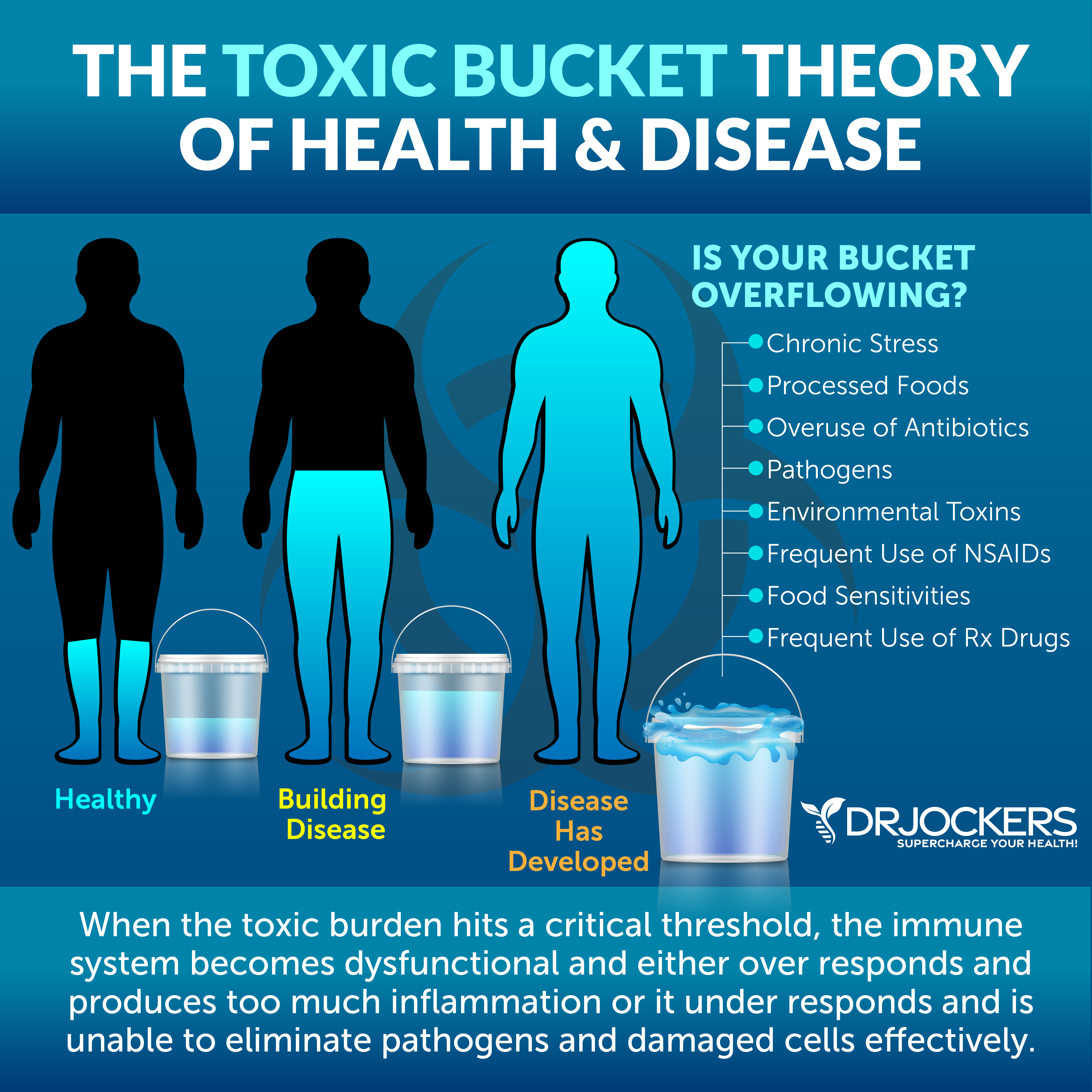
Importance of Natural Laundry Detergent
Looking at this list of chemicals and toxins in commercial laundry detergents may make you think twice about using them again. What is the alternative though?
You can use natural laundry detergent. Don’t forget about fabric softeners and dryer sheets either. Switch to organic and natural in those too. Natural laundry detergent is free from these dangerous chemicals and toxins. They don’t cause irritation, allergies, and inflammation in most.
Natural laundry detergent keeps your clothes healthy and clean without harming your or your family’s health. Not all-natural laundry detergents are equal though. Some don’t work as well as others. Read on to learn more about natural laundry detergent and the best natural laundry detergent option I’ve found on the market.
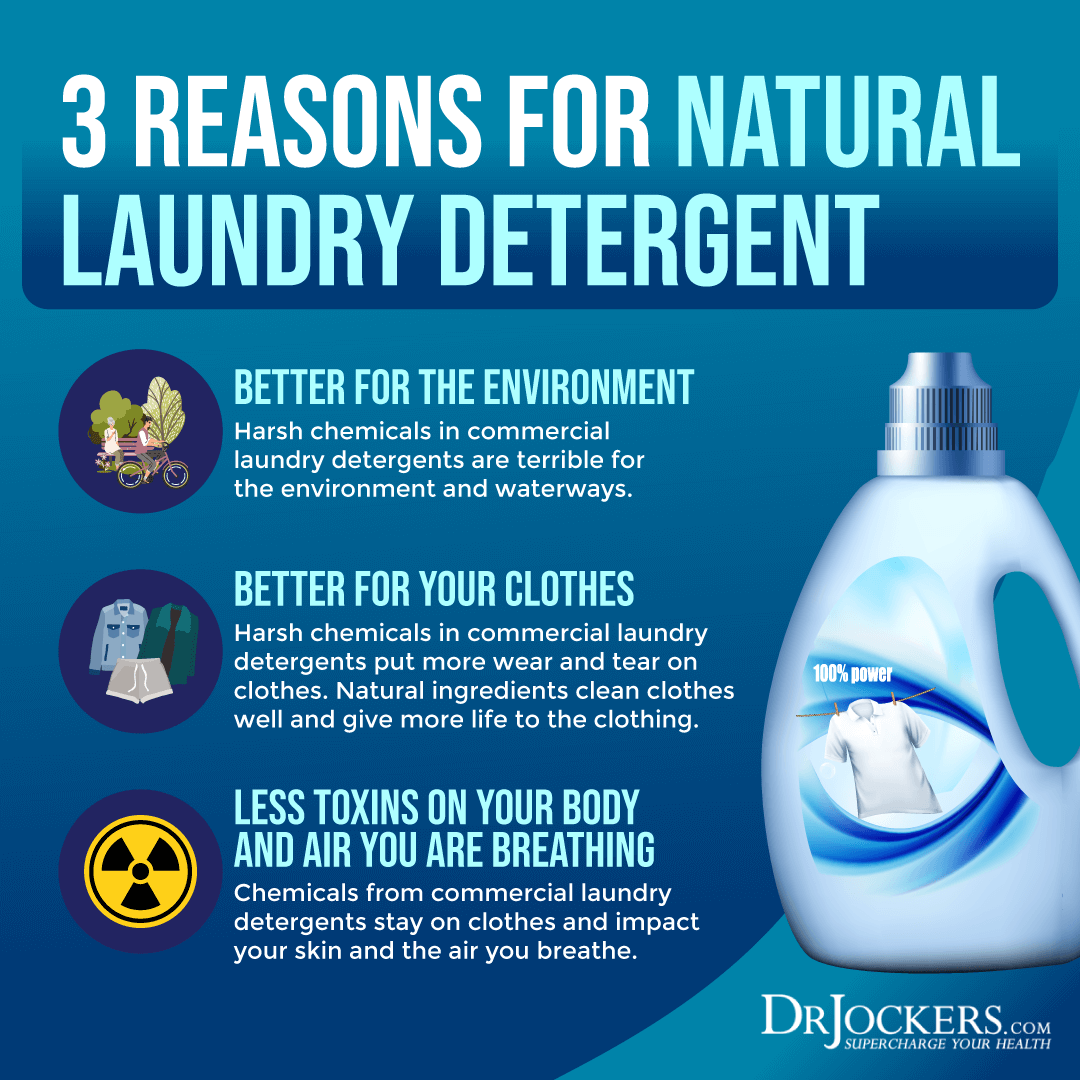
Myths About Natural Laundry Detergent
Some people argue that commercial laundry detergents are more effective at cleaning and are more cost-effective than natural laundry detergents. This is just simply not true.
Commercial laundry detergents were never invented to create a more effective cleaner. The truth is that during World War II, there was a shortage of vegetables and animal fat they used to use to create soap for laundry. Though the all-natural soaps used up until that point were highly effective, there was simply a shortage. Chemical-filled options came to the rescue and stayed behind after the war ended. They quickly replaced all-natural soaps in the 1950s.
Of course, today they are advertised as superior, highly effective cleaners. But they are not more effective. They may even be less effective. Just think about what you learn about toxic optician brighteners that don’t remove stains but simply hide them from visible light (10). In addition to not being more effective than many all-natural options, they are filled with chemicals and toxins that may harm your health.
Now here comes the second concern: price. It’s true that mass-produced commercial laundry detergents can be cheap. This depends on the brand of course. Buying off-brand or store-brand laundry detergent can be cheap. Buying more popular brands is pricier.
When you think about the cost of commercial detergent, you have to think about more than just the actual price tag. You are buying heavy jugs of detergents, yet much of it is water. You may be paying more for the water than the detergent itself. Not to mention that the rest of the ingredients are toxic chemicals that can harm your health. Doctor visits, medication, and medical procedures can cost a lot. And there is no price tag on your health.
Buying new jugs all the time is also a waste that leads to useless environmental harm. Choosing a natural laundry detergent without toxic chemicals, health risks, and having to buy a new plastic jug every time is a smarter option. In the end, you will likely save money by not buying new jugs and not piling up medical bills.
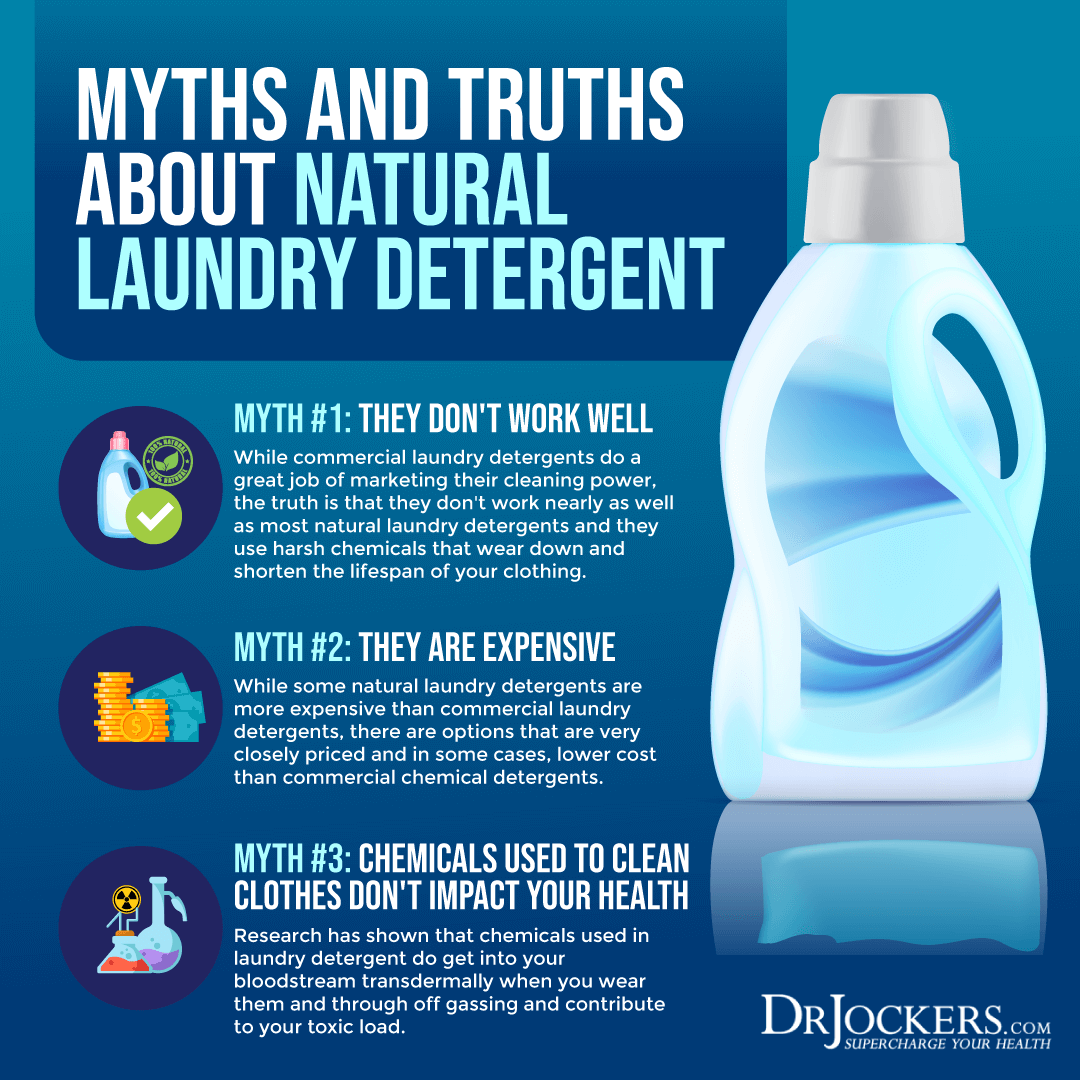
Natural Laundry Detergent Comparisons
If you are looking for a new laundry detergent or other household, body, or beauty products, it’s smart to consult with the Environmental Protection Agency (EWG)’s Skin Deep Database (17). You may be surprised to find that some of your favorite brands are toxic or questionable at the least.
So, what are your options? You want natural, but you need it to work. You need clean clothes and safety for your health.
- Homemade: There are many homemade and DIY laundry detergent options online you can make with borax, Fels Naptha soap, and other ingredients. Unfortunately, these don’t always work. Your whites may turn gray and dingy. You can do better. Not to mention, you may not have the time to make homemade products.
- Molly’s Suds: Unfortunately, this option is not powerful enough for really dirty clothes. You don’t want to see stains and don’t want to smell deodorant.
- Branch Basics: This is a popular option, and it works well. The problem is the price. It’s quite expensive at $69 for only a starter kit.
- Seventh Generation: Seventh Generation is also a popular option. It is much more affordable than Branch Basics. Unfortunately, it’s not always the best for whites, greasy, and dirty clothes. They require you to pre-treat your clothes. If you want to save time, it’s not the best.
- Thieves Laundry Detergent by Young Living: This is another popular option made with essential oils. But again, it’s expensive at $45 to $50 a bottle.
- Truly Free: Truly Free is the best laundry detergent I could find. It works and it’s affordable. Continue onto the next section to learn more about Truly Free.
Introducing Truly Free
Truly Free is a US company from Michigan that makes natural laundry practices better.
It uses less packaging, which is better for the environment. It is free from toxic chemicals, including toxic fragrances, making it a better and safer option for your health. It uses completely natural ingredients, which I love to see as a functional and natural medicine doctor.
It works. It truly works. My clothes come out clean. Even my kid’s muddy, dirty clothes come out clean after soccer practice. Food stains that are also common in a family with four little ones also come out easily. Our clothes smell fresh and nice without the use of toxic fragrances.
And it’s affordable and good for your budget. They offer a 100% no-risk, 30-day money-back guarantee. Use the link here to get 100 loads for free and use the coupon code DRJOCKERS at checkout to save an extra 30% off your order.
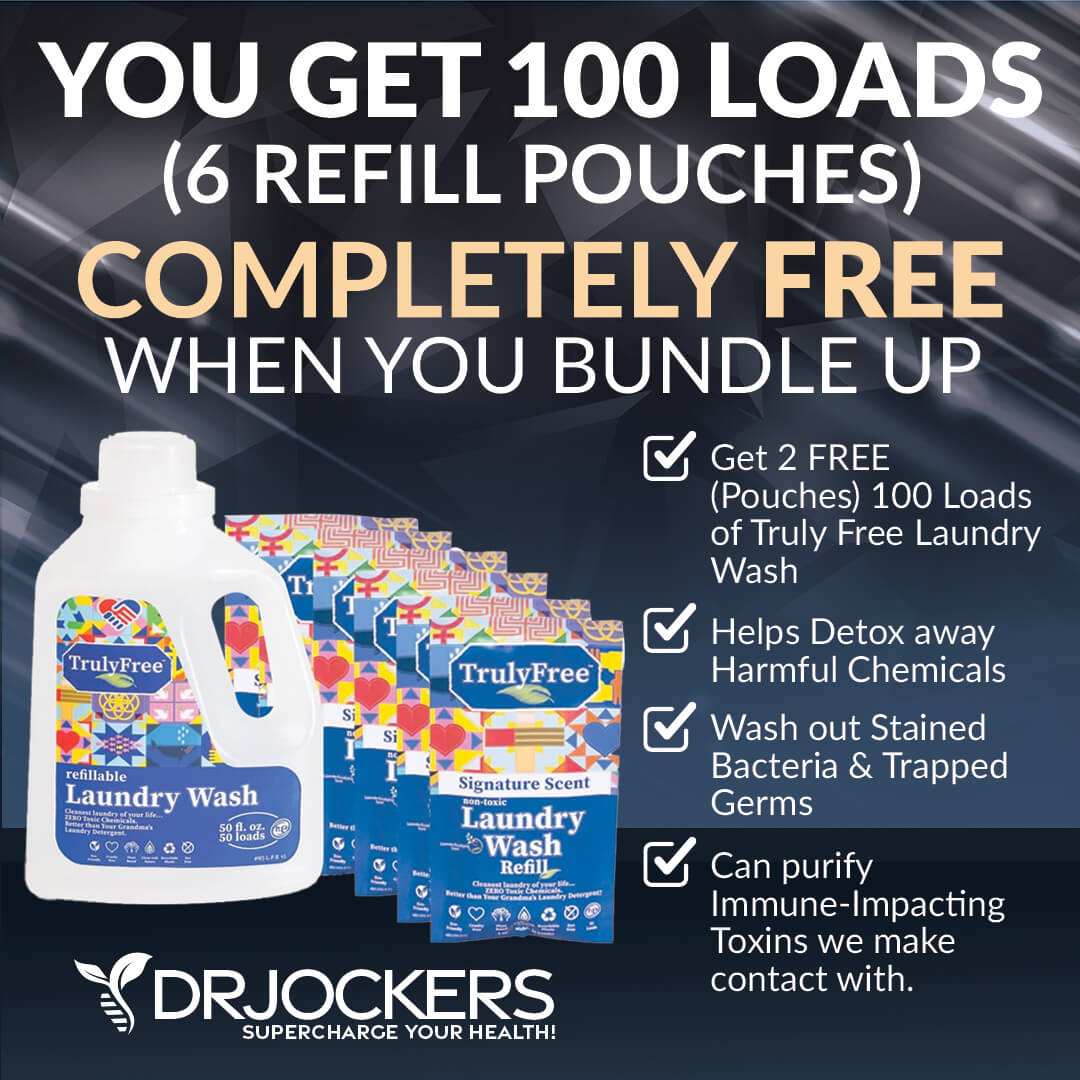 Final Thoughts
Final Thoughts
Commercial laundry detergent is full of chemicals and toxins. It can cause irritation of your skin, eyes, respiratory tract, and lungs, allergic reactions, and asthma. It may increase the risk of chronic symptoms, chronic health issues, and cancer.
Choosing a natural laundry detergent is important for your health. I recommend and personally use Truly Free. Try it to experience clean clothes without toxicity. Use the link here to get 100 loads for free use the coupon code DRJOCKERS at checkout to save an extra 30% off your order.
If you want to work with a functional health coach, I recommend this article with tips on how to find a great coach. On our website, we offer long-distance functional health coaching programs. For further support with your health goals, just reach out and our fantastic coaches are here to support your journey.
Inflammation Crushing Ebundle
The Inflammation Crushing Ebundle is designed to help you improve your brain, liver, immune system and discover the healing strategies, foods and recipes to burn fat, reduce inflammation and Thrive in Life!
As a doctor of natural medicine, I have spent the past 20 years studying the best healing strategies and worked with hundreds of coaching clients, helping them overcome chronic health conditions and optimize their overall health.
In our Inflammation Crushing Ebundle, I have put together my very best strategies to reduce inflammation and optimize your healing potential. Take a look at what you will get inside these valuable guides below!
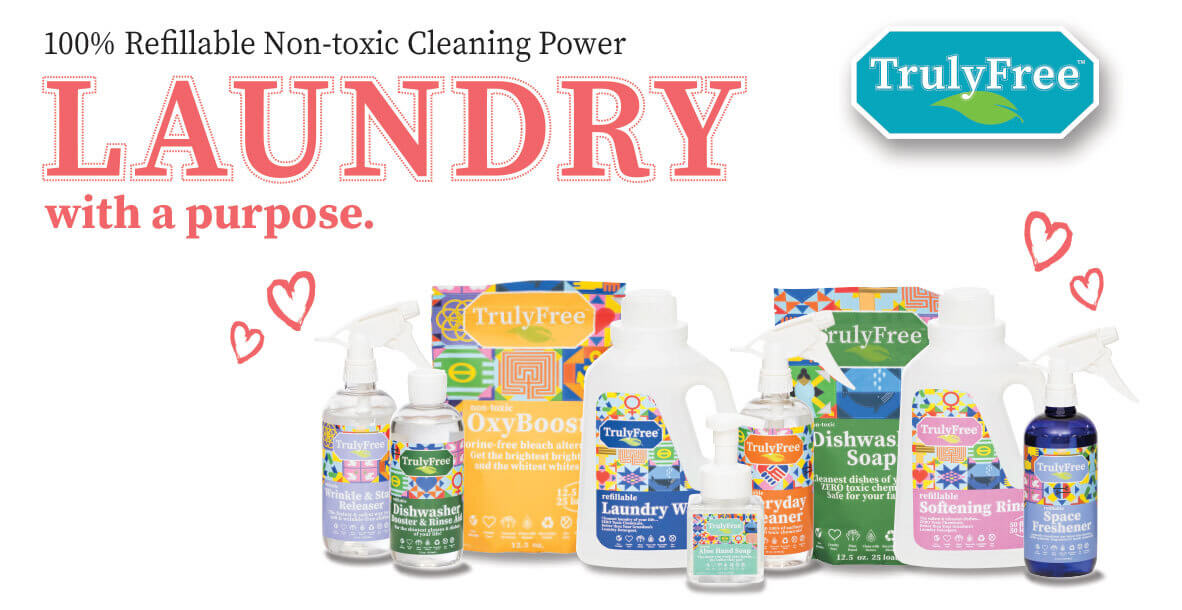





I like your comparisons but wish you would have also considered the natural Soap Nuts. They are natural, biodegradable, contain no additives, chemicals, dyes, are affordable, can pre-treat if wanted but not required, require just a few for several washes, can be used in regular or HE washers, can be used to replace a toxic dryer sheet. So can you add this into your comparison?
That is a good idea. Thank you!
Where can I find Soap Nuts? I would like to try them. I have a lot of allergies.
Thank!s!
I’ve purchased them through https://greenvirginproducts.com/ for years, now. In addition to what’s listed above, but have antibiotic and antifungal properties, as well as producing negative greywater from the wash. The dried husks – I purchase them as halves, so the internal resin is more readily accessed – can be boiled down to produce a natural soap that’s great for skin and hair … it’s really got a great life cycle in your home.
And a note on dryer sheets, with soap nuts you don’t need to put anything in the dryer – your clothing dries just fine and smells like … clothes.
I use Truly Free products; it’s a bit misleading on the number of loads of laundry – the quantity for the number of loads is for an HE machine. It typically uses twice as much for a top loading machine. Still a good product!
Yes we love the Truly Free! It is a great product that works well and saves money!
Even better and cheaper: white vinegar!
I have been using it for years! Clothes smell super fresh, come out clean. Doesn’t take much, I buy it cheap at Costco. add a dash of regular table salt. That’s it. Cannot remember who I learned his from….maybe Mercola?
How much vinegar for a large load?
Not much! Maybe half cup is what I use! And all my clothes are soft and smell great!
How much vinegar per load?
Angela, Do you use the white vinegar in place of detergent or fabric softener?
One fear of people about changing to natural detergents is that the machines could be damaged, because they are not designed for this.
The usual detergents are, I believe quite alkaline. If so, a change to a more acid-based method might have implications for the washers/seals etc of the washing machine?
Can someone re-assure us about this being a misconception?
I have been using Norwex…could you add a comparison for them? Truly Free sounds great, and I will try them out. Thank you for all you do, and all the information you give!
Yes that is a great idea. Thanks for your support!
I use Norwex as well. Would love to hear your comments on their products!
I used Truly Green, works well for non-smelly clothes. I called to ask what I was doing wrong that my clothes came out with an odd smell. They said I would need to use the oxy boost with the laundry soap. That does work, but that’s disappointing that I need to add another product to get clothes clean, and the price is almost out of my range.
Sorry to hear about that Carol!
LOVE LOVE LOVE Truly Free!!! I’ve been using it now for about 2 years! My husband was diagnosed with prostate cancer and I knew we needed to make changes! I looked for different brands of detergent at the store only to realize the “natural” brands didn’t work well. Then I was blessed to receive an email about Truly Free! Loved it and haven’t looked back since! It’s convenient, affordable and its Shipped right to my home every month saving me time and money! Bonus I’ve used the same bottles this whole time! I’m not adding to plastic bottles to the environment! They also have other great products! Their Heavy Duty Degreaser is Phenomenal! In the kitchen or on car rims just spray and wipe the grease the just comes right off!
Love these products!♥️♥️♥️
Yes we feel the same about Truly Free! Great company and products!
I’m saddened that you’re recommending a product packaged in a BIG PLASTIC JUG.
There are many sheet and powder laundry products packaged in paper. We cannot take care of ourselves without taking care of our planet.
Good news Nina, you actually only purchase the jug once and then they send the refills in little packets and you just mix with water into your jugs so you actually reuse the jugs for years (decades even) and you really never need to purchase any jugs again. That is one of the many reasons we love Truly Free!!
Yes, I have also been using the sheet laundry soap as well. I like that also. Earth Breeze is great!
All of the detergents claim more loads than you actually can get. I typically get a quarter of the loads as they claim, but I guess that is fine. You just have to realize that before you buy them.
I am a full time RV’er and love EarthBreeze. Takes up so little space. I get at least the 60 loads they claim. I love that they also donate to local charities and plant trees with every order.
Truly Free is good, just not practical for us.
Hi Anita: How do you determine how much detergent to use for a heavy duty load of laundry? I also use at least twice whatever is indicated, but I don’t know how to tell if it’s really necessary.
I just bought the new “green” laundry soap from Walmart with three scents so I got a box of each. The box is biodegradable and recycled. The little sheets inside go away in the wash and they seem to get the clothes clean. Only problem is the men in the family noticed itching and sores on their skin that they did not have prior to the switch. I did not tell them I switched. I then looked at the msds sheets online for each of the ingredients and wow was I surprised. The first two ingredients are safe and good for the wash, but every ingredient after that is a hazard to skin. Wash immediately from skin. Protect from skin exposure. Another damages organs with repeated exposure. A couple said do not release into environment. Extremely toxic to aquatic life with long lasting results. Another is a lung targeted carcinogen. They all say not recommended in food, drug, pesticide or biocidal product use. But we can all save the earth if we just chemically poison ourselves with laundry soap.
I’ve used Truly Free for several
Mints . My problem withe company is there is no marking on the lid to indicate how much to use. Their claim is you get 50 loads out of a 50 ounce bottle. Well you have to find out how much one ounce is. It’s very little and it seems impossible to be enough to clean a load of clothes . Another problem is they send orders I haven’t placed with them. I’d like to order items I need or want , when I want them . Otherwise, the products seem effective .
Dr Jockers, have you tried and or tested Melaleuca’s laundry detergent? I am a member but dont buy the detergent often due to the price and im not convinced it’s the best on the market. What is your opinion? Im curious if their products have been 3rd party tested
We’re full time RV’ers, limited space and I switched to laundry sheets by EarthBreeze. Clothes are clean and fresh smelling. Packaging is biodegradable and EarthBreeze gives back to the planet and to the community.
I have tried truly free and dr. mercola’s pods. They are both good. Right now I am using Zum because it smells so good. It is supposed to be more natural but I’m not sure about the comparison. My sister gave me a bottle to try. I really like it but it is not refillable.
I might try truly free again. I had a subscription when they were mygreenfills. It worked well for my clothes but not for my husbands dirty work clothes. Then I would have to use the oxyboost and sometimes it would leave lighter spots. Maybe their formula has improved and I also have a better washing machine.
Do you recommend the scented version or the unscented version? Which one do you use? What is the ingredient used for the scent – – essential oils?
Your articles are excellent. I really enjoy reading them. I have a young daughter are trying to get all unnecessary chemicals out of the day to day.
I was interested to see that http://www.ecos.com did not make your shortlist and interested as to why that would be ?
Thanks Nick, yes this looks like a very good company as well.
Hello Truly Free,
I just purchased the combo with the free 300 loads. I only wish this was available in unscented. I don’t really like any scents and if I do, I like to get the scent when using a fabric softener or dryer sheet. This is rare though. I would strongly prefer non scented not only because of health but I find the scents will change over t ime.
Dear Dr Jockers/
When I see the large range of supplements, I as many will get a little
overwhelmed.
I have been an M E sufferer for 29 years; I did it ! worked though 2 viral
infections ,& have rarely been free of it.( recently 2 weeks, which was the longest ) , can you please tell me what products, you can recommend to alleviate the problem , which I am happy to purchase, if you can consider, helpful.
Kind Regards/ Richard Hider
You should look into the Magnetic Washing System. I have used it for over 7 years now and I would not use anything else. The two magnetics remove in the wash from your clothes all chemicals including this sprayed on your new clothes before shipping, the left over soap on your clothes from years of washing, plus many stains including black markers that are considered permanent. The latter takes few washes but it sure surprised me. I have not bought laundry soap in seven years, nor fabric softener. The magnets last 50 years. If you have an agitator in your washer, you never hear the magnets, but if no agitator, then you hear them moving only during the wash cycle. They can used in hot, warm or cold wash.
Since there are copy cats of almost every invention / recipe, I want to know the system that works for you. is it called the “Life Miracle Magnetic Laundry System”?
Thanks, Dr. Jockers!! I will be looking into Truly Free after I finish typing this comment. Your website/newsletter is one of the few I will tolerate because you so freely offer information without making people jump through a lot of hoops. One click and there is a wealth of wisdom readily available without an additional prompt to “register” or “sign up” for access. Keep up the good work!
I am having trouble with Truly Free’s detergent clumping up in the bottle. At first it’s fine then after a bit when I pour the detergent has collected in clumps so I would think each load isn’t getting the right amount of detergent. The company said to mix it up with hot water which I’m doing but still clumping and if I shake it it foams up then you can’t see the line in the cap to fill it to. Anyone else have this problem?
I purchased the Truly Free products and they all seem to work well, however laundry needs pre-treating for stains or any whites. There are a number if issues I do have that leave a bad taste in my mouth (no I am not eating it, lol).
Realize this is an extremely high pressure sales organization. You will be barraged with add-ons, pressure and communications that will easily get your order to well over $200! They will try to sell you ever cleaning product that you can imagine. What really irks me is that you cannot buy individual products, say dish detergent, you have to buy a package loaded with things you do not need.
The cap for the laundry bottle is oversized so people will tend to use more product than necessary. It holds 3 1/2 ounces while the maxim load takes two. Using too much detergent can leave residue that causes fabrics to attract dirt. There are also meaningless lines inside the cap marked one through five, if you use these you will not be adding enough detergent and not leaning your clothes very well.
Overall I was not pleased with the extreme high pressure sales tactics and was disappointed that Dr. Jockers holds this company in such high regard.
You have a typo on your slide called You Think These Products Have Been Tested? (on https://drjockers.com/natural-laundry-detergent/) It says last udated (instead of updated) in 1976.
What are the ingredients in Truly Free?
Ok I am confused…. It says you get 300 loads free with a bundle???? But when you click the link, it says only 100 loads???? And what bundling is it taking about?
Are the pouches liquid or powder? And why do you need the jug? How many loads do you get from a pouch?
Thanks
Annie!
I have tried Truly Free, but it is NOT USDA certified organic, so I won’t be using it again. I’m using an organic liquid detergent now that seems to work fine but I am still looking for an organic laundry sheet. If anyone knows of one, please share the info with me.
Thanks,
Becky
I’m really sad to see that you are recommending a laundry detergent that contains fragrance, even if it is “natural, non-toxic or whatever”. Fragrances, no matter what the source are allergenic or problematic for many people. Do you know about Clearly Clean products? This would be a safer fragrance free laundry detergent that works well.